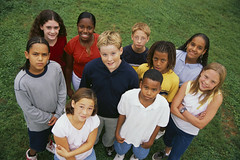Category — 4.5 Ten to Twelve 6-12: Social/Emotional Skills
Social/Emotional Skills
Between ages 10 to 12 years, children’s social and emotional skills (see full Glossary) are developing well. They are interested in others around them and really want to fit in. Their self-esteem is developing and solidifying itself, but they still rely on those around them, for positive support and feedback.
SOCIAL
At this age, children can:
- take turns;
- share, though can be a bit possessive about personal belongings;
- value friendships;
- hang out with friends (Fig. 1), without adult supervision;
- take into account the points of view of others.
Figure 1. Hanging out with friends
EMOTIONAL
At this age, children:
- have good impulse control (see full Glossary);
- have a good idea of who they are;
- care a great deal about what others think of them;
- can usually label their feelings quite well (For example: “I am very angry right now.”);
- can usually label the feelings of others;
- show genuine concern if someone is hurt, physically or emotionally.
Did you know?
Children at this age often have a best friend (Fig. 2) with whom they will spend most of their time. Best friends help children understand the complexities of the world and how unpredictable life can be. Best friends are often each other’s “rock.” They provide each other with a solid shoulder to lean on.
Figure 2. Best friends
Children at this age are extremely aware of their bodies, and they start to value their privacy (though not necessarily that of others). They may demand that you knock on their door before entering their room. This is a typical part of growing up and should not be seen as a sign of rejection. Your child, who is now pre-pubescent, is just getting ready for the next big stage in his or her life: adolescence!
see References
November 20, 2011 No Comments

